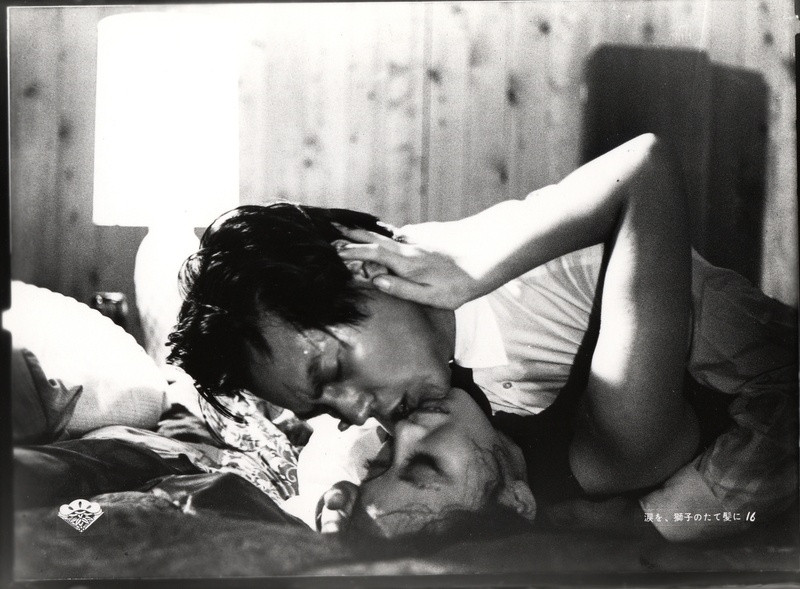
Shochiku Nouvelle Vague 2007 / Namida wo shishi no tategami ni / Japan 1962
A dock-worker named Murakami lets himself be manipulated by the boss into intimidating the headman forming a trade union movement, but the latter ends up getting killed in the attack... This early Shinoda film inspired by American dramas of the 1950s could adapt the subheading “Rebel without a Cause on the Waterfront”.

This early Shinoda film, which shows the director’s conversancy in the plots of American social dramas of the 1950s, could bear the subheading “Rebel without a Cause on the Waterfront”. The plot is not original, but the shooting method and dolly shots, clearly inspired by the French New Wave, give a sense of the filmmaker’s abilities before they developed in full in his following films. A dockworker named Murakami takes the side of his employer and protégé in a conflict between the workers and the company owner. Under the influence of his morally corrupt benefactor, however, the hot-headed Murakami degrades into the boss’s personal henchman. He allows himself to be manipulated into intimidating the headman forming the trade union movement, but the latter ends up being killed in the attack, and turns out to have been the father of the girl that Murakami is courting. He finds himself incapable of forgiving himself for his wrongdoing, even in the arms of his boss’s wife... Beyond the schematic storyline and acting performances comes a colourful description of the dockyard environment and the port of Yokohama.
103 min / Black & white, 35 mm
Director Masahiro Shinoda
/ Screenplay Shuji Terayama, Ichiro Mizunuma, Masahiro Shinoda
/ Dir. of Photography Masao Kosugi
/ Music Tôru Takemitsu
/ Producer Masao Shirai
/ Production Shochiku
/ Cast Takashi Fujiki, Mariko Kaga, Kyôko Kishida, Tamotsu Hayakawa, Sô Yamamura, Koji Nambara
/ Contact Shochiku Co., Ltd., The Japan Foundation

Masahiro Shinoda (b. 1931, Gifu prefecture) is a director known as the intellectual of the Japanese New Wave. He studied theatre history at university but was forced to seek work early on after the death of his mother in 1953. His experience in the Shochiku studio led to his debut One Way Ticket to Love, 1960. From the outset Shinoda was fascinated by the deeper psychology and aesthetics that his distinct visual style brought to his films. After leaving Shochiku in 1965, in an independent production, he focused on the work of classic dramatist Monzaemon, among others. The films Double Suicide, 1969 and Gonza the Spearman, 1986, for which Shinoda was awarded a special Silver Bear at the Berlin Festival, were based on Monzaemon’s work. The films Silence, 1971 and MacArthur’s Children, 1984, in which the director turned to the consequences of the Second World War for his generation, were both distributed in Czech cinemas.
Shochiku Co., Ltd.
4-1-1 Tsukiji, Togeki Bldg. 12th Floor, Chuo-Ku, 104 8422, Tokyo
Japan
Phone: +81 355 501 623
Fax: +81 355 501 654
E-mail: [email protected]
The Japan Foundation
4-16-3 Yotsuya, Shinjuku-ku, 160-0004, Tokyo
Japan
Phone: +81 355 623 535
Fax: +81 355 623 500
E-mail: [email protected]

Junko Kawaguchi

Masahiro Shinoda
Film Director, Film Director

Marie Suzuki
Institution
First-hand brews throughout the year.
Be among the first to learn about upcoming events and other news. We only send the newsletter when we have something to say.